Training Veterinary Professors of the Future: New NC State Program Welcomes Inaugural Class
The new Veterinary Academic Leaders Program will help 10 hospital residents prepare for careers in academia at a time when veterinary shortages are leading to crises.

To expand the pipeline of veterinarians who train the healers of the future, the NC State College of Veterinary Medicine has created a Veterinary Academic Leaders Program that will help participants prepare for careers in academia.
The college recently chose an inaugural group of 10 first-year residents who will become VAL program fellows during a time when national veterinarian shortages are creating critical needs.
According to data released by the AVMA, only about 6% of veterinarians in the United States are engaged in academic practice. Veterinary colleges throughout the world are struggling to fill academic positions needed to teach students and move veterinary research forward, said Dr. Kate Meurs, dean of the NC State College of Veterinary Medicine. The challenges will be compounded by upcoming retirements and a large efflux of specialty trained veterinarians entering private specialty practice, she said.
Dr. Joshua Stern, associate dean for research and graduate studies, will lead the Veterinary Academic Leaders Program.
“Over the course of what will be a three-year program, our VAL fellows will work hand in hand with leading academic veterinarians to develop a toolkit that prepares them to compete and succeed as faculty members and clinician scientists,” Stern said. “NC State is dedicated to continuing to develop a pipeline of veterinary academicians who will go on to lead the academy and train future generations of veterinarians across the globe.”
In the past two years, nearly a dozen colleges and universities have proposed adding veterinary medicine to their academic program offerings. Currently, there are 33 veterinary colleges in the United States, and all of them are recruiting for faculty positions.
“Who will be leading these program expansions and training veterinary students?” Stern said. “NC State hopes that the VAL fellowship program will help to answer this call.”
The diverse and talented NC State Veterinary Hospital residents who will be the first Veterinary Academic Leaders fellows are:
- Cody Atkinson – Small Animal Internal Medicine
- Elisabeth Collins – Ophthalmology
- Lexi Fielding – Large Animal Surgery
- Maria Guzman – Emergency and Critical Care
- Siena Mitman – Ruminant Health Management
- Mickaël Pinto – Dermatology
- Leo Ragazzo – Cardiology
- Sarah Saylor – Small Animal Surgery
- Hayley S. Stratton – Zoological Medicine
- Kristy Williams – Cardiology
Mitman, who got her DVM at Tufts University in Massachusetts, came to NC State College of Veterinary Medicine for an internship and accepted a three-year residency as well. Professors who understand her career goals in public health encouraged her to apply to be a VAL fellow, she says.
“My interest is staying in an academic setting where I can blend the clinical side of veterinary medicine with global health research and work in advocacy that blends all of it,” said Mitman, who also has a master’s in public health from the University of Minnesota. “It sounds like I would have a lot to learn from this program, and it’s a pretty cool opportunity for someone with my interests.”
The Veterinary Academic Leaders program will have a three-pronged approach:
- Monthly dinner meetings with expert guest speakers and round-table discussions to promote sharing ideas and to foster peer mentoring.
- Research training and support that includes grant-writing instruction, formal feedback and up to $15,000 in funding to perform clinician scientist research, present at conferences and publish work.
- Membership and participation in the NC State College of Veterinary Medicine’s Academy of Educators.

“NC State is making a big investment in the future of the profession,” Stern said. “We’re building a community of veterinary academic leaders through a combination of small group training opportunities, research funding and formal continuing education support.”
Mitman said she also is excited by the idea of having another support system and resource among the nine other fellows
“We’ll have similar goals, but we’re all in different medical specialties, so to form those connections and relationships will be pretty cool,” she said. “And the faculty who are giving their time to this program? They’re incredible resources. To be able to have some time to get to know them and learn from them, especially dedicated time that you get through a program like this, will be amazing.”


